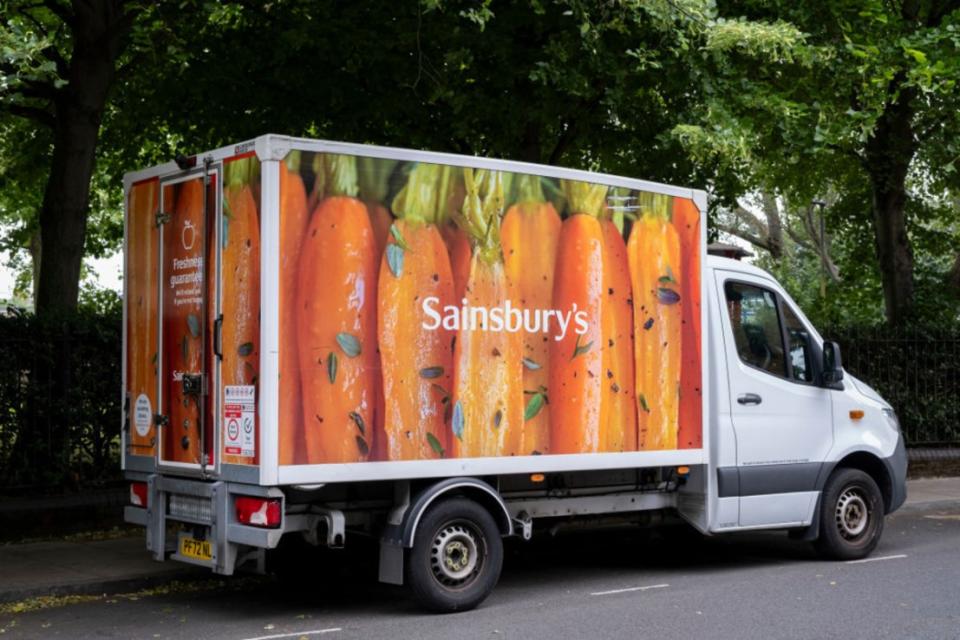Sainsbury’s shares slip as investors spooked by latest update

Sainsbury’s shares have slipped this morning after an underwhelming update on non-food sales at grocery giant.
Shares slipped around 4 per cent but have come back to a less than 2 per cent fall.
Sainsbury’s food sales have continued to grow with the supermarket gaining a boost from its one hour grocery delivery service and its Aldi price match scheme.
But the London-listed group, which launched a £200m share buyback programme in April, only saw its overall sales grow 4 per cent year on year in the 16 weeks to June 22, 2024, with non-food sales failing to live up to expectations.
Sainsbury’s said this was down to a focus on “value and innovation” after it extended its Aldi price match scheme to include more than 650 products.
The number of customers using the supermarket’s one hour “on demand” delivery service grew more than 80 per cent during the quarter, with general online grocery sales up 14 per cent.
Argos, however, saw sales decrease by 6.2 per over the 16 weeks, with Sainsbury’s blaming “an unseasonal start to summer” which , impacted seasonal categories like house and garden and outdoor furniture especially hard.
It added that weaker sales of electronics had been driven by softer demand, particularly in gaming.
Sainsbury’s shares were down 3.99 per cent or 10.28p to 247.52p in early trading and have fallen more than 9 per cent in the past year.
Victoria Scholar, head of investment at Interactive Investor, said: “Sainsbury’s has been struggling to differentiate itself from rivals with stiff competition on price from the German discounters Aldi and Lidl while its premium ranges fall short of those on offer at Waitrose and Marks & Spencer.
“Nonetheless Sainsbury’s continues to make headway in growing its market share versus rivals with potential for further growth as inflation pressures subsides, a boost from the summer sun that has only recently appeared, and the excitement around the Euros.”
Price match equals ‘big baskets’
CEO Simon Roberts said:”We are pleased with our market-beating grocery performance and the early progress we’re making against our Next Level Sainsbury’s plan. We’ve been winning from competitors every month for 15 months, as more and more people are choosing Sainsbury’s for their big weekly shop.
“We are laser focused on delivering the best combination of value and quality in the market and our customers are recognising that with 98% of big baskets including Nectar Prices or Aldi Price Match.
“Innovation continues to be a top priority and we launched 400 new products this quarter, almost half of which were Taste the Difference, which continues to outperform a strong premium market.
“Our summer ranges are the perfect complement to this ‘Summer of Sport’ and we’re gearing up for Wimbledon this week and England’s quarter final match on Saturday night.
“Our food business is going from strength to strength and I would like to thank all of my colleagues and our suppliers and farmers for the brilliant job they are doing every day to deliver for all our customers.”
Sainsbury’s “could do better”
Russ Mould, investment director at AJ Bell said: “Sainsbury’s has the same nagging feeling as the England football team – it eventually scores a goal but you know it could do a lot better.
“On the one hand, the food business is trucking along nicely and the grocer is winning market share. On the other hand, non-food items across clothing and general merchandise including Argos aren’t resonating with its customer base.
“Sainsbury’s has a food-first strategy so it might argue that as long as the core part of the business is doing fine, the rest will eventually catch up.
“However, the non-food operations have been letting the side down for a long time and causing unwelcome distractions for management when they could be doing even more to capitalise on the new-found strength in food.
“It’s beginning to have a lot of similarities to the Marks and Spencer of old, running a two-pronged business with one engine constantly spluttering.
“Marks and Spencer has finally fixed its engine problem and is now racing away, which might give some hope to Sainsbury’s situation.
“Analysts are optimistic about the non-food bit because the year-on-year comparative figures will soon be easier to beat, but that doesn’t get to the root of the problem, which is why consumers aren’t choosing Sainsbury’s for clothing and general merchandise in the way they used to.
“After all, its Tu clothing brand was once seen as a robust player in the market, and Argos has certainly been the envy of the retail world in the past.
“It’s clear that a lot more work is needed to reshape the proposition, otherwise one has to question if the non-food operations are worth bothering with at all.”

 Yahoo Finance
Yahoo Finance 